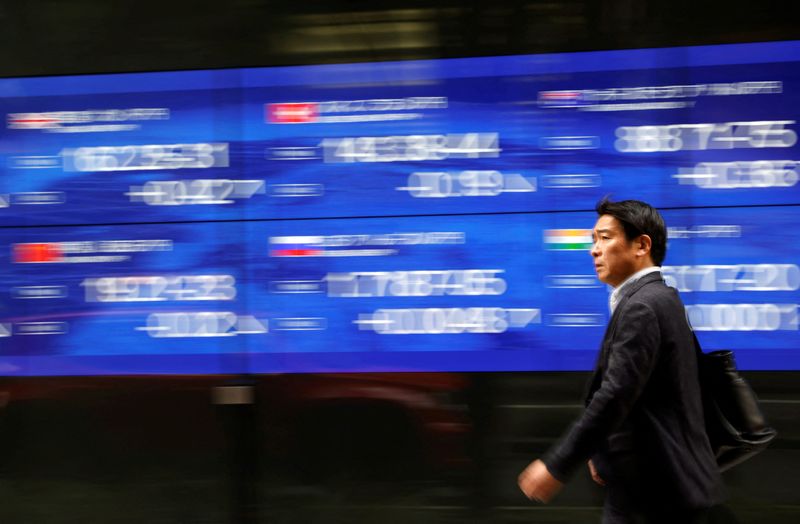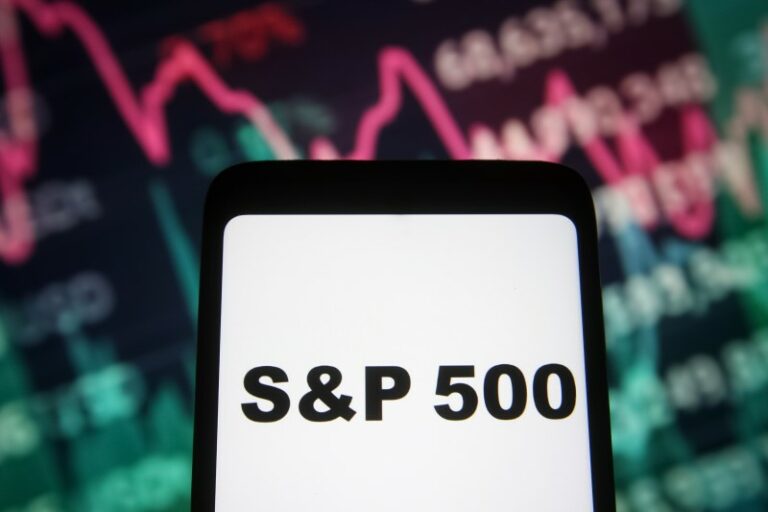
© Reuters. FILE PHOTO: A passerby walks past an electric monitor displaying various countries’ stock price index outside a bank in Tokyo, Japan, March 22, 2023. REUTERS/Issei Kato/File Photo
By Herbert Lash and Marc Jones
NEW YORK/LONDON (Reuters) -Global equity markets rebounded on Thursday on expectations that interest cuts by the Federal Reserve and other central banks were coming, though not as soon as hoped for, while Treasury yields slid again on concerns about regional U.S. banks.
Fed Chair Jerome Powell on Wednesday pushed back on market speculation that rates would be cut in March, sparking a sell-off on Wall Street that lingered into Thursday until investors turned their focus to corporate earnings.
MSCI’s index of equity performance in 47 countries at first seesawed but later rose as investors looked ahead to results from megacap stars Apple (NASDAQ:), Amazon.com (NASDAQ:) and Meta Platforms (NASDAQ:) after the bell.
A number of investors already had discounted the narrative that many rate cuts were on the horizon, said Rick Meckler, partner at Cherry Lane Investments in New Vernon, New Jersey.
“To most investors the important thing is the trend that rates are likely headed lower, even if it’s not as quickly as some would like,” Meckler said, adding the focus is now on earnings and whether megacap results can support their prices.
Apple’s iPhone sales are expected to show the best growth in five quarters, but analysts see a tough year for the company in China. Traders are eager to see if Amazon can cash in on its delivery heft by boosting fee revenue from its “Buy With Prime” service.
MSCI’s all-country world index closed up 0.67%. On Wall Street, the rose 0.97%, the added 1.25% and the advanced 1.3%.
Futures have pared bets for a rate cut in March to 37.5% from almost 90% at year-end 2023, but increased the likelihood of a cut or two to 96% when the Fed meets in May, according to CME Group’s (NASDAQ:) FedWatch Tool.
The Fed’s inflation fight got a boost on Thursday, with data showing U.S. worker productivity grew more quickly than expected in the fourth quarter to keep unit labor costs contained.
Labor Department data also showed job market momentum is slowly fading, which could help to curb wage inflation. Other data showed first-time applications for unemployment benefits rose to a two-month high last week.
The dollar fell against the euro and yen, while sterling rebounded after a Bank of England meeting that sought more evidence of slowing inflation before it would cut rates.
The , a measure of the U.S. currency against six others, fell 0.52%. The euro rose 0.48% to $1.0868, the yen strengthened 0.32% to 146.42 per dollar and sterling was at $1.2744, up 0.47% on the day.
Euro zone inflation eased as expected last month but underlying price pressures fell less than forecast, likely boosting the European Central Bank’s argument that rate cuts should not be rushed.
The pan-European index lost 0.37%.
Treasuries rallied strongly, with 10-year yields slipping 10 basis points to 3.865%, amid jitters over regional U.S. banks after shares of New York Community Bancorp (NYSE:) fell further on concerns about commercial real estate.
The KBW Regional Banking index fell 2.28%.
“If we didn’t have the issue with New York Bancorp, where concerns about tight credit conditions clearly affected the profitability of that bank, then we would probably be talking about a different story for rates,” said Paresh Upadhyaya, director of fixed currency strategy Amundi US in Boston.
Asian markets were choppy overnight. MSCI’s broadest index of Asia-Pacific shares rose 0.2%, helped by Chinese blue chips that snapped a four-day slide, along with better surveys on home prices and manufacturing.
eased 0.8% as the yen gained.
Oil prices fell more 2% after false market speculation that Israel agreed to a Gaza ceasefire. A Qatar official told Reuters that Hamas has received a ceasefire proposal positively, but it has not yet responded to it.
futures plummeted $1.85 to settle at $78.70 a barrel, while U.S. West Texas Intermediate crude futures fell $2.03 to settle at $73.82.
Gold firmed nearer a one-month high after data showed U.S. weekly jobless claims rose last week.
U.S. settled 0.2% higher at $2071.10 an ounce.


